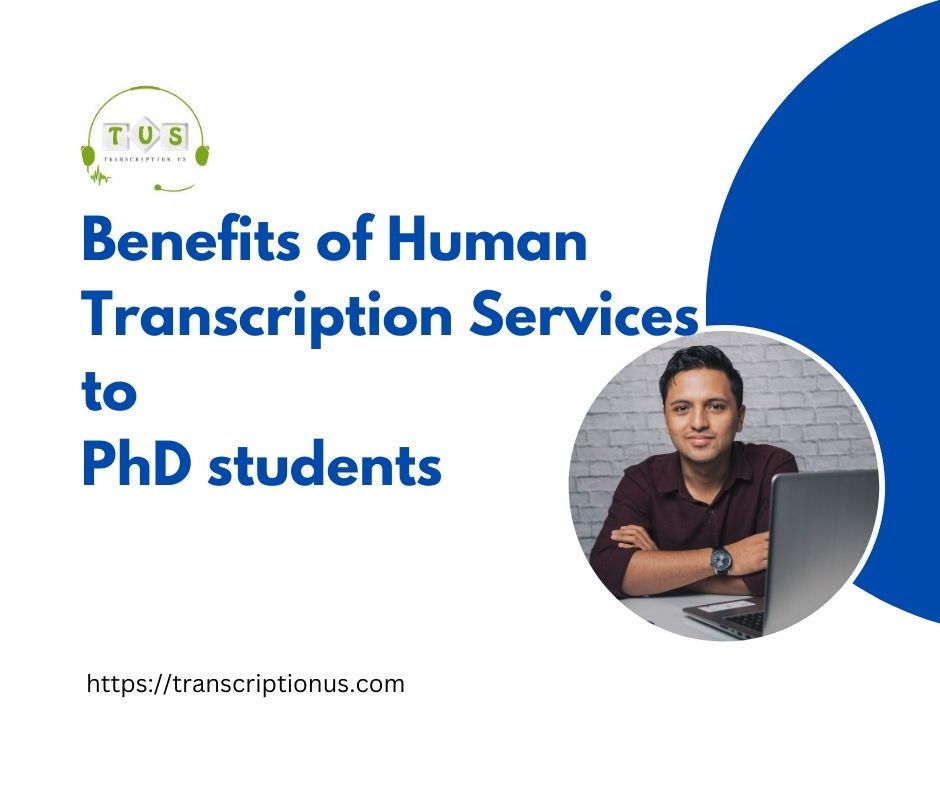
Human transcription services involve the conversion of speech into written or electronic text by a human transcriptionist. With the increasing need for accurate documentation in various industries, the demand for human transcription services has also grown. Human transcription services ensure that the content is accurately transcribed and free of errors, making it easier for businesses and PhD students to use and analyze the information. Human transcription services are commonly used in the academic field as they require detailed and accurate documentation. By using human transcription services, PhD students can save time and resources while also ensuring that their documentation is of high quality.
PhD transcription services refer to professional human transcription services that cater specifically to the needs of PhD students and researchers. PhD transcription services involve the conversion of spoken content, such as interviews, focus group discussions, lectures, or any other audio recordings related to research, into written text. PhD transcription services aim to provide accurate and reliable transcriptions to assist students in their academic endeavors, particularly during the data collection and analysis phases of their research projects.
Human transcription services can offer several benefits to PhD students in various ways. Here are some of the key benefits of Human Transcription Services:
Time-Saving:
PhD students often have a significant amount of data to analyze, and transcribing interviews, focus groups, or other qualitative data can be time-consuming. Dissertation transcription services can save time by providing accurate transcriptions, allowing PhD students to focus on data analysis and interpretation.
Accuracy:
Human transcription services can offer a higher level of accuracy compared to automated transcription tools, especially when dealing with complex or technical content. This accuracy is crucial for maintaining the integrity of research findings. Human transcription services guarantee highly accurate transcriptions to maintain the integrity of research data.
Quality and Understanding:
Human transcription services can better understand and interpret context, nuances, and accents, resulting in more accurate and meaningful transcriptions. This is especially important for interviews with participants from diverse linguistic backgrounds. Familiarity with the academic context and specific requirements of PhD research, ensuring that transcriptions meet the standards expected in academic settings.
Formatting and Editing:
Educational transcription services often provide well-formatted and edited transcripts, saving students the time and effort required to clean up and format automated transcriptions. Human transcription services offering options for verbatim transcriptions, which include all spoken words, pauses, and non-verbal cues, or cleaned transcriptions that edit out filler words and unnecessary elements.
Confidentiality and Security:
Human transcription services often have strict confidentiality measures in place to protect sensitive research data. This is crucial for PhD students working with confidential or proprietary information. Adherence to strict confidentiality and data security measures to protect sensitive research information.
Customization:
Human transcribers can adapt to specific requirements, such as formatting preferences or the inclusion of non-verbal cues. This level of customization can be challenging to achieve with automated transcription tools. However, human transcription services have the ability to customize transcriptions based on the preferences of the researcher, such as formatting styles or the inclusion of timestamps.
Reduced Cognitive Load:
Outsourcing transcription tasks allows PhD students to reduce their cognitive load. Human transcription services enabling them to focus on more critical aspects of their research, such as data analysis, writing, and defending their thesis.
Accessibility:
Transcribing interviews or lectures can enhance accessibility for individuals with hearing impairments or those who prefer to read rather than listen to audio content. This is in line with the principles of inclusive research.
Professionalism:
Well-transcribed interviews and data contribute to the overall professionalism of research. Proficiency in transcribing content that may include technical or specialized vocabulary commonly found in academic research. This is important when presenting findings, publishing papers, or sharing information with the academic community.
Collaboration and Communication:
Effective communication channels for collaboration between the transcription service provider and the researcher to address specific requirements and any potential clarifications.
Meeting Deadlines:
Human transcription services can provide quick turnaround times, helping PhD students meet tight deadlines for research submissions, presentations, or conference abstracts.
To Conclude:
PhD transcription services can be particularly beneficial for doctoral candidates who require accurate and timely transcriptions as part of their research process. By outsourcing transcription tasks, PhD students can focus more on data analysis, interpretation, and the overall advancement of their academic work. While there may be a cost associated with using human transcription services, many PhD students find the investment worthwhile due to the time saved, the quality of the transcriptions, and the overall improvement in the research process.
FAQs
Q: What is the difference between human and automated transcription?
A: Human transcription services involve the conversion of speech into written or electronic text by a human transcriptionist. Automated transcription tools use artificial intelligence (AI) to convert speech into text.
Q: What are the benefits of using human transcription services?
A: Human transcription services can offer several benefits to PhD students in various ways, including saving time, improving accuracy, and ensuring quality.
Q: What are the costs of using human transcription services?
A: Human transcription services can vary in cost depending on the length of the audio file, the turnaround time required, and the level of expertise of the transcriptionist. Our pricing starts at $0.80 per recorded minute.
Q: How do I find a reliable human transcription service?
A: There are a number of factors to consider when choosing a human transcription service, including the experience and expertise of the transcriptionists, the turnaround time, and the cost. We provide transcription and translation service from 2013 and maintain high-accuracy rate >98%.
Q: What are the different types of human transcription services?
A: There are a variety of human transcription services available. We provide general transcription, legal transcription, and academic transcription utilizing the power of trained human transcriptionists.